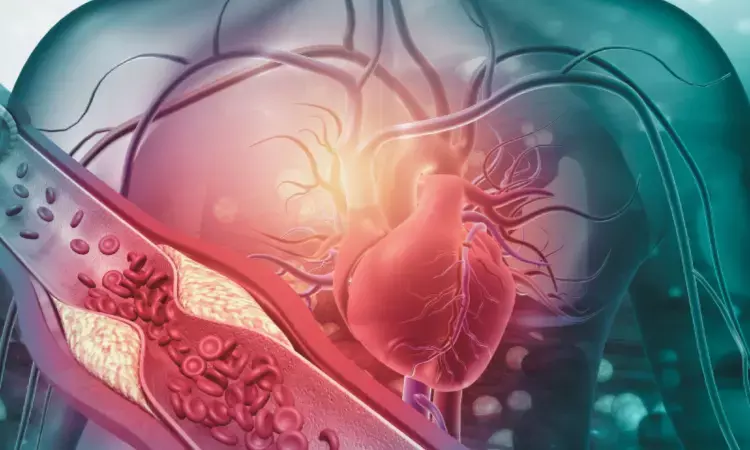- Home
- Medical news & Guidelines
- Anesthesiology
- Cardiology and CTVS
- Critical Care
- Dentistry
- Dermatology
- Diabetes and Endocrinology
- ENT
- Gastroenterology
- Medicine
- Nephrology
- Neurology
- Obstretics-Gynaecology
- Oncology
- Ophthalmology
- Orthopaedics
- Pediatrics-Neonatology
- Psychiatry
- Pulmonology
- Radiology
- Surgery
- Urology
- Laboratory Medicine
- Diet
- Nursing
- Paramedical
- Physiotherapy
- Health news
- Fact Check
- Bone Health Fact Check
- Brain Health Fact Check
- Cancer Related Fact Check
- Child Care Fact Check
- Dental and oral health fact check
- Diabetes and metabolic health fact check
- Diet and Nutrition Fact Check
- Eye and ENT Care Fact Check
- Fitness fact check
- Gut health fact check
- Heart health fact check
- Kidney health fact check
- Medical education fact check
- Men's health fact check
- Respiratory fact check
- Skin and hair care fact check
- Vaccine and Immunization fact check
- Women's health fact check
- AYUSH
- State News
- Andaman and Nicobar Islands
- Andhra Pradesh
- Arunachal Pradesh
- Assam
- Bihar
- Chandigarh
- Chattisgarh
- Dadra and Nagar Haveli
- Daman and Diu
- Delhi
- Goa
- Gujarat
- Haryana
- Himachal Pradesh
- Jammu & Kashmir
- Jharkhand
- Karnataka
- Kerala
- Ladakh
- Lakshadweep
- Madhya Pradesh
- Maharashtra
- Manipur
- Meghalaya
- Mizoram
- Nagaland
- Odisha
- Puducherry
- Punjab
- Rajasthan
- Sikkim
- Tamil Nadu
- Telangana
- Tripura
- Uttar Pradesh
- Uttrakhand
- West Bengal
- Medical Education
- Industry
Plozasiran effective for reducing triglyceride level in patients with severe hypertriglyceridemia: SHASTA-2 trial

USA: Findings from the SHASTA-2 randomized clinical trial (RCT) published in JAMA Cardiology have demonstrated the potential clinical utility of plozasiran to reduce triglyceride (TG) levels in patients with severe hypertriglyceridemia (sHTG).
The phase 2b randomized clinical trial of 229 patients with sHTG revealed that subcutaneously administered plozasiran (dosed on day one and week 12) led to significant placebo-subtracted reductions in mean triglyceride level to −57% and apolipoprotein C3 level to −77% at 24 weeks with a substantial treatment difference persisting at 48 weeks.
Plozasiran demonstrated a generally favorable safety profile.
Severe hypertriglyceridemia, ie, plasma triglyceride level greater than 500 mg/dL is typically multifactorial, involving genetic susceptibility and a combination of lifestyle, diet, drugs, alcohol intake, and/or comorbidities such as obesity, hypothyroidism, and type 2 diabetes. sHTG confers an increased risk of nonalcoholic steatohepatitis, atherosclerotic cardiovascular disease (ASCVD), and acute pancreatitis. Despite available treatments, persistent ASCVD and acute pancreatitis-associated morbidity from sHTG remain.
Against the above background, Christie M. Ballantyne, Texas Heart Institute, Baylor College of Medicine, Houston, Texas, and colleagues aimed to Determine the efficacy, tolerability, and dose of plozasiran, an APOC3-targeted small interfering–RNA (siRNA) drug, for lowering apolipoprotein C3 (APOC3, regulator of triglyceride metabolism) and triglyceride levels. They also evaluated its effects on other lipid parameters in patients with sHTG.
For this purpose, the researchers conducted a placebo-controlled, double-blind, dose-ranging, phase 2b RCT (SHASTA-2) enrolling adults with sHTG at 74 centers across Europe, the US, Australia, New Zealand, and Canada from 2021 to 2023. Eligible patients had fasting triglyceride levels ranging from 500 to 4000 mg/dL while receiving stable lipid-lowering treatment.
Participants received two subcutaneous plozasiran doses (10, 25, or 50 mg) or matched placebo on day one and at week 12 and were followed up through week 48. Of 229 patients, 226 (mean age, 55 years; 78% males) were included in the primary analysis. Baseline mean triglyceride level was 897 mg/dL and plasma APOC3 level was 32 mg/dL.
The primary endpoint evaluated the placebo-subtracted difference in means of percentage triglyceride change at week 24.
The study led to the following findings:
- Plozasiran induced significant dose-dependent placebo-adjusted least squares (LS)–mean reduction in triglyceride levels (primary endpoint) of −57%, driven by placebo-adjusted reductions in APOC3 of –77% at week 24 with the highest dose.
- Among plozasiran-treated patients, 90.6% achieved a triglyceride level of less than 500 mg/dL.
- Plozasiran was associated with dose-dependent increases in low-density lipoprotein cholesterol (LDL-C) levels, which was significant in patients receiving the highest dose (placebo-adjusted LS-mean increase of 60%.
- Apolipoprotein B (ApoB) levels did not increase, and non–high-density lipoprotein cholesterol (HDL-C) levels decreased significantly at all doses, with a placebo-adjusted change of −20% at the highest dose.
- There were significant durable reductions in remnant cholesterol and ApoB48 and increases in HDL-C levels through week 48.
- Adverse event rates were similar in plozasiran-treated patients vs placebo.
- Serious adverse events were mild to moderate, not considered treatment-related, and none led to discontinuation or death.
In the RCTS of adults with sHTG, plozasiran treatment led to substantial and durable decreases in triglyceride-rich lipoprotein and TG levels with a favorable tolerability and safety profile in the phase 2 trial of moderate size.
"Our study results support further development of plozasiran for the sHTG treatment and exploration of its effects on important clinical events, such as the reduction of acute pancreatitis," the researchers wrote. "Moreover, there is a need to study pleiotropic effects of plozasiran on atherogenic lipoproteins thought to promote ASCVD in a larger trial."
Reference:
Gaudet D, Pall D, Watts GF, et al. Plozasiran (ARO-APOC3) for Severe Hypertriglyceridemia: The SHASTA-2 Randomized Clinical Trial. JAMA Cardiol. Published online April 07, 2024. doi:10.1001/jamacardio.2024.0959
Dr Kamal Kant Kohli-MBBS, DTCD- a chest specialist with more than 30 years of practice and a flair for writing clinical articles, Dr Kamal Kant Kohli joined Medical Dialogues as a Chief Editor of Medical News. Besides writing articles, as an editor, he proofreads and verifies all the medical content published on Medical Dialogues including those coming from journals, studies,medical conferences,guidelines etc. Email: drkohli@medicaldialogues.in. Contact no. 011-43720751


